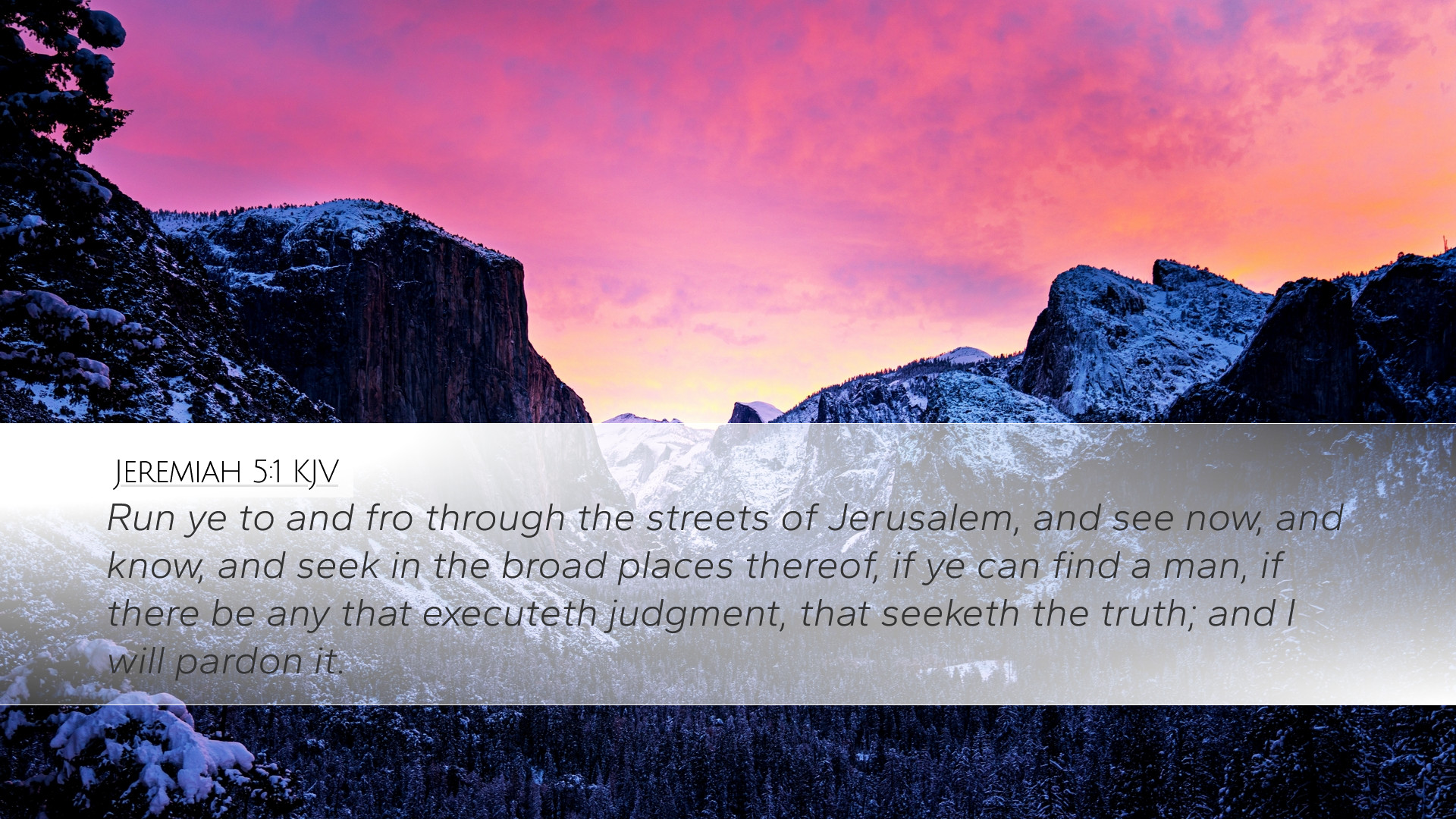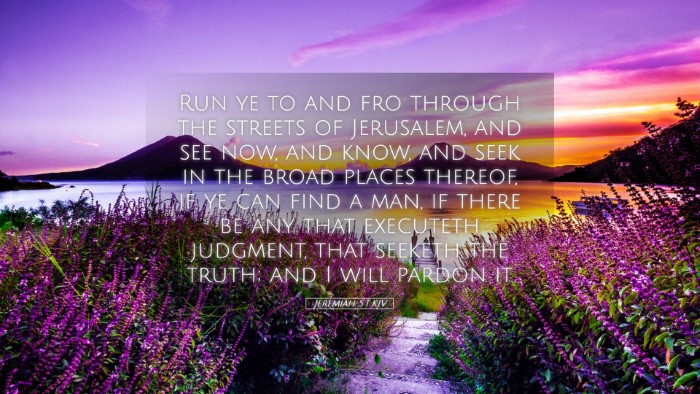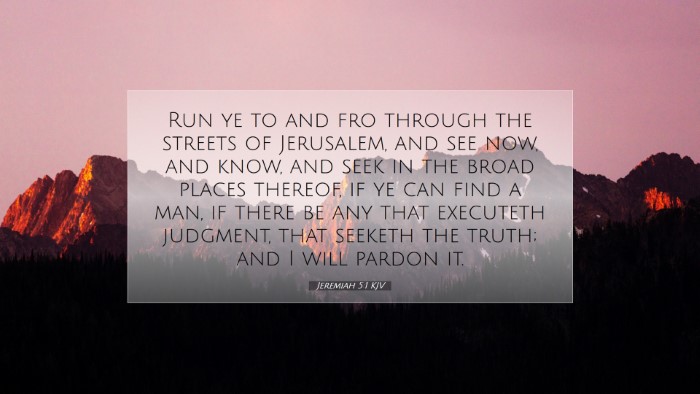Commentary on Jeremiah 5:1
Jeremiah 5:1 states:
"Run ye to and fro through the streets of Jerusalem, and see now, and know, and seek in the broad places thereof, if ye can find a man, if there be any that executeth judgment, that seeketh the truth; and I will pardon it."
Introduction
This verse captures a profound moment in the prophetic ministry of Jeremiah. It is not merely an exhortation but a reflective and revealing challenge to the state of morality and justice in Jerusalem. Together, we will explore insights from esteemed theologians and commentators in history, including Matthew Henry, Albert Barnes, and Adam Clarke. Their perspectives shed light on the historical context, theological implications, and practical applications of this passage.
Contextual Background
Before delving into the specific commentary, it is vital to understand the historical backdrop of Jeremiah's ministry. Jeremiah prophesied during a tumultuous time in Israel's history, characterized by moral decay, idolatry, and imminent judgment from God due to the people's rebellion against divine commandments.
Jeremiah’s Role as a Prophet
As one of the major prophets, Jeremiah's responsibility was to call the people of Judah back to faithfulness to Yahweh. He often spoke against the corrupt practices of the leaders and the people, showcasing a deep concern for genuine justice and truth.
Exegesis of Jeremiah 5:1
In this verse, Jeremiah is commanded to survey Jerusalem for a person who practices righteousness and seeks the truth. This quest is both a literal and rhetorical device. The urgency and desperation of the call reflect the dire spiritual condition of the city.
Key Elements of the Verse
- “Run ye to and fro through the streets of Jerusalem”: This phrase suggests an active and desperate search. Matthew Henry notes that this running symbolizes a call to urgency; the situation is alarming, and immediate action is needed.
- “If ye can find a man”: Albert Barnes points out that the search is for one righteous individual, indicating that even a single person seeking justice could sway God's decision. This suggests a remnant theme pervasive throughout biblical texts.
- “That executeth judgment, that seeketh the truth”: Adam Clarke emphasizes the significance of justice and truth as foundational pillars of society. The lack of these virtues in Jerusalem highlights the nation's spiritual bankruptcy.
- “And I will pardon it”: The conditional nature of God’s pardon reveals divine mercy, even in the face of widespread sin. Theological implications here suggest that while judgment is imminent, it can be altered through genuine repentance and righteousness.
Theological Reflections
This verse raises crucial theological questions regarding God's judgment and human responsibility. The inward search for righteousness underscores the belief that God seeks a covenant relationship and is willing to extend grace, even in dire circumstances.
The Nature of God's Justice
As Matthew Henry articulates, God's justice is not arbitrary; it demands righteousness not merely from individuals but from communities. This call to find a righteous person stresses that society as a whole bears responsibility for its moral state.
The Search for Righteousness
Albert Barnes emphasizes that finding even a few righteous individuals can have profound implications for a nation's fate. This notion reflects biblical principles found in the narratives of Abraham’s intercession for Sodom (Genesis 18) and the idea of a faithful remnant.
God's Desire for Repentance
The verse illustrates God's desire for repentance rather than judgment, aligning with themes present throughout the prophetic literature. Adam Clarke highlights that the search implies hope—a chance for redemption if the people turn back to God.
Practical Applications for Today
This passage is not just a historical commentary but a call to modern believers and leaders to evaluate their own commitment to justice and truth.
For Pastors and Leaders
- Examine Your Community: Just as Jeremiah was instructed to look for righteousness in Jerusalem, church leaders should assess their congregations and communities for moral integrity and social justice.
- Foster a Culture of Truth: Create environments where seeking truth and justice is encouraged. Sermons and teachings should challenge congregants to uphold these values.
For Students and Scholars
- Engage in Critical Reflection: The quest for “a man” provocatively challenges students and scholars to examine their contributions to society’s moral fabric. Where do they stand on issues of justice?
- Explore the Implications of Righteousness: Delve deeper into the significance of justice in biblical theology. How does it inform modern ethical discourse within the church and society?
For Theological Discussion
- Discuss Divine Mercy and Judgment: Engage in conversations about the balance of God’s justice and mercy. How does this verse shape our understanding of God’s character?
- Identify Modern-Day ‘Jerusalems’: Identify contemporary contexts where justice and truth are lacking and discuss how believers can respond to these challenges.
Conclusion
In Jeremiah 5:1, we encounter a powerful summons to recognize the spiritual state of communities and our own roles within them. This prophetic call reverberates through history, challenging all individuals—pastors, students, theologians, and scholars—to seek and exemplify justice and truth. As we reflect on this passage, may we recognize that each of us can be part of God’s redemptive plan, seeking not only our own righteousness but advocating for the righteousness that transforms communities.


